
Unrest in the Middle East has been an unrelenting problem for centuries, the Gordian knot that cannot be cut. The founding of Israel in May 1948 further complicated matters, leading to several wars and a state of heightened tension. While there have been many international efforts to find a lasting peace in the Middle East, the Camp David Accords marked the first substantive step toward that end and still stand as a watershed moment. After meeting in secret at Camp David for 13 days of negations, the parties were able to make a breakthrough in the talks. President Jimmy Carter, President Anwar El Sadat of Egypt, and Prime Minister Menachem Begin signed the Camp David Accords on September 17, 1978.
The Accords comprised A Framework for Peace in the Middle East, and A Framework for the Conclusion of a Peace Treaty between Egypt and Israel. The first framework was later condemned by the United Nations General Assembly because it regarded Palestinian territories without participation from the Palestinians. The second framework though, led directly to the 1979 Egypt-Israel peace treaty, which is still in effect today, despite considerable upheaval in the region.
The Accords and subsequent events, including Sadat’s historic visit to Jerusalem, were very controversial, especially in the Arab world. Yasser Arafat of the PLO, King Hussein of Jordan, and Hafez al-Assad of Syria refused to participate in multilateral peace talks, and many Arabs turned against Sadat because they believed he wasn’t defending the Arab objective. Despite criticism back home, Begin and Sadat received world-wide praise for their efforts. As a result of the Camp David Accords, Begin and Sadat were both awarded the Nobel Peace Prize in 1978.
Ambassadors Samuel W. Lewis and Hermann Frederick Eilts reflect on their experiences during the often heated negotiations, the difficulties in reaching a compromise, the race to get an agreement before the deadline, and the trouble with the accords that started coming up almost immediately afterward. Eilts served as Ambassador to Egypt from 1974-79, and Lewis as Ambassador to Israel from 1977-85; both were crucial players in the negotiations. Ambassador Lewis was interviewed by Peter Jessup in 1998; Ambassador Eilts was interviewed by Ambassador William D. Brewer in 1988.
You can read about the Yom Kippur War, which helped lay the groundwork for negotiations, Sadat’s key role in the negotiations, his assassination, the opening of the UN Sinai Field Mission, and other Moments on the Middle East.
Invitations to Camp David
LEWIS: Carter sent [Secretary of State Cyrus] Vance with a hand-written invitation first to Jerusalem and then to Cairo, inviting Begin and Sadat to Camp David. Begin, who had been hoping for such an invitation, accepted immediately and so did Sadat. The stage was set by early August for the Camp David meeting in September 1978.
In retrospect, it is clear that Begin and Sadat had concluded by this time that the negotiating process between their two governments had come to an end and that a meeting between the two of them hosted by Carter might be the only hope for progress. So they both accepted the invitation with alacrity. There was about a month between the invitation having been delivered and the start of the Camp David conference, on September 5, 1978.
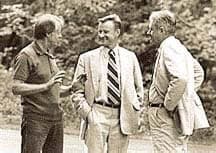
Carter was extremely well briefed; he was really on top of the material and was knowledgeable of all aspects — having been immersed almost continuously with the problem for eighteen months.
Therefore, he knew much about Sadat and Begin already; he had met them before and understood their political constraints. He was particularly interested in overcoming the psychological barrier that had been erected in the past six- eight months in the aftermath of Sadat’s trip to Jerusalem — things had gone off the track in that period and the Sadat-Begin relationships had become increasingly tense. They had not met since Christmas Day of 1977.
The State [Department] officials were by and large rather pessimistic about what could be achieved at Camp David. Carter had asked State to prepare a set of goals for what might be achieved. I remember that during the lunch, Carter indicated that he thought the goals were far too modest and that he was setting his sights considerably higher.
He was aiming for a full peace, not a partial or intermediary solution. I thought at the time that it was very wise for Carter to shoot high, although I also was not as optimistic as the President as what might be realistically expected. I notice from my notes for this period that I shared Carter’s qualified optimism more than some of the other advisors. I felt that all parties had too much riding on the conference to let it fail, but it was still up to Carter to put a viable package together, which was terrifically difficult task.
EILTS: Carter had said, “I want to do something for the Palestinians,” which I must say gave me great hope. And he said, “You know, I think we should be able to do something, get something done in four or five days.” I remember we were making bets on how long it would take.
Nerves Run High as Confrontation Looms
EILTS: Before we went to Camp David, I had seen Sadat prior to my own flight back to Washington. Sadat had said, “I want a confrontation with the Israelis, and I need Carter’s help on it. They are not really being responsive to anything, as you know.” At least this was the way he said it, “I want a confrontation.” Begin, as I understand it, reckoned that there would be an effort to get a confrontation.
LEWIS: On September 5, I met Begin at the airport. In the helicopter that took us from Andrews Air Force Base to Camp David, Begin was very keyed up. He was almost manic in the way he was approaching the conference. He was very excited. Ezer Weizman was very jumpy; he thought that Begin was too confident and he was very worried. He thought if the conference went badly, Begin would become very defiant, which would have been characteristic. Weizman worried about the potential problems ahead. Dayan, as always, was very contained and reserved. He like all the other Israelis was very tense.

EILTS: Both Sam Lewis, our Ambassador to Israel, and I warned the President at that luncheon, “Don’t bring Sadat and Begin together, other than for social events.” The reason was clear.
By that time, Sadat’s reaction to Begin, despite their earlier meetings, was very negative and bitter. Carter seemed to accept that. To our surprise, however, no sooner had we gotten to Camp David when Carter called Sadat and Begin together and said to Sadat, “Mr. President why don’t you read your proposal?” Sadat hadn’t been prepared for this, but he had the Egyptian proposal with him and in a monotone he read that proposal. Begin was chafing at the bit.
At the end of the presentation, Carter said, “Well, let’s now adjourn and meet again tomorrow morning.” Then Carter came to the American delegation. He looked at Sam Lewis and at me, and said, “You fellows told me not to get them together. It worked beautifully. No problem.”
The following morning he got them together again. No sooner were they seated when Begin said, “Mr. President, if you’re going to accept this man’s (Sadat, he was much more polite) proposal, I insist the Israeli proposal be accepted as the basis for discussion.”
With that Sadat, pointing to Begin, said, “This man is responsible for all the problems.” Sparks were flying and Carter had to adjourn the meeting right away.
From that point on the negotiations took place between the American delegation and the Israelis; and the American delegation and the Egyptians. There was no direct negotiating between Egyptians and Israelis. Sadat and Begin didn’t meet again except in a social context.
A Difference in Strategy Between Sadat and Begin
LEWIS: On the second night, Carter joined the American delegation at about ten o’clock after having watched the movie. He spent about two and half hours with the whole American delegation, describing his impressions of the initial meeting between Sadat, Begin and himself.
He outlined what he saw the strategy for the rest of the conference to be; he described the personalities and their positions and assessed the prospects. He also told us at that time about some very sensitive concessions that Sadat had made to him privately for Carter’s use with Begin whenever Carter felt that they would be effective. It was an extraordinary meeting.
Carter dealt with all of us as part of his team. That was flattering to me and to Eilts. He revealed a lot more about his views, his strategy and other people than he had done previously, except perhaps to his own immediate inner White House circle.
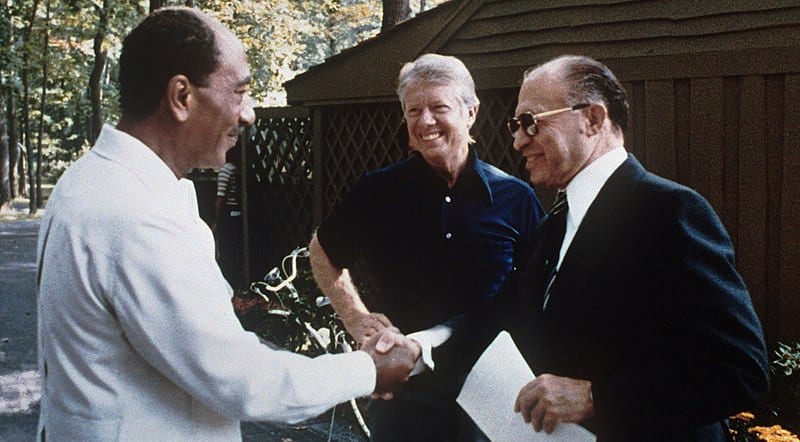
Sadat had adopted what I considered a brilliant strategy in dealing with Carter; that strategy culminated at Camp David. Sadat was uninterested in details; he was interested only in the broad principles. Begin was very interested in the details and every language change was significant to Begin.
So Begin took a real interest in the drafting and redrafting of every document; Sadat took less interest, but listened to his staff. His staff, which had unanimously objected to Sadat coming to Camp David at all, felt he was in a very tough position and didn’t really want to agree to anything.
Begin’s staff was very eager for an agreement and their strategy throughout was designed to bring Begin around to something that was acceptable to others and viable from the Israeli point of view. Therefore, the strategy of the two delegations were almost mirror images.
Camp David succeeded in part because Sadat over-ruled all of his advisors. Begin ultimately acquiesced in certain concessions that his delegation had urged on him and which Carter was pressing for. Sadat’s technique was to express full confidence in Carter’s understanding of Egypt’s situation and full reliance on Carter’s unwillingness to do anything that would hurt Egypt.
He implicitly and explicitly put himself in Carter’s hands, which of course was very flattering to Carter. Begin on the other hand looked with a very gimlet eye on the crosses on the “t”s and the dots on the “i”s of anything that Carter would suggest, which did not create the same sympathetic attitude that Sadat’s approach did. Apparently, in the course of the early meetings, Sadat had given Carter a number of specific fall-back positions that he would agree to if Carter told him that they were necessary to achieve an agreement. He left the tactics entirely up to Carter.
EILTS: The first ten days — first of all it took much more than a week — by the end of the tenth day we still had no agreement on anything. Every agreement was tentative, conditional on something else. So it went. Carter was becoming very impatient. He had immobilized himself at Camp David for this long a period.
And he finally said to the parties, “I have to go back to Washington on Sunday. Either we get something by Sunday, or it’s a failure.” By then, of course, his own prestige was heavily invested in this, which was important.
Settling Sinai
EILTS: On the evening of the tenth day, a Thursday, Sadat was finally persuaded by Carter, Vance and Ezer Weizman to receive [Minister of Foreign Affairs Moshe] Dayan. Dayan, in his customary forthright fashion, told Sadat, “If anyone has told you, Mr. President, that any Israeli government can get out of the Sinai settlements, they’re deluding you. It can’t be.” It was Weizman who had told this to Sadat. This so upset Sadat that he called me. He said, “I have to see the President.”
He saw President Carter and said, “I’m leaving. If I can’t even get the Sinai settlements out of this, what’s the use of coming here?” Now that forced Carter, who up to that point had been trying to persuade Sadat to allow the Sinai settlements to remain, if not under IDF — Israeli Defense Force — protection, under UNEF [United Nations Emergency Force, deployed in the Middle East in 1956 after the Suez Crisis] or even Egyptian military protection.
Sadat had consistently refused. Carter was now forced to go to Begin and say, “Mr. Prime Minister, here’s the situation. Nobody is going to understand why this peace conference fell apart because of your insistence on remaining in Sinai.”
And Begin, with obvious reluctance, because it went against everything he stood for, agreed to submit the issue of removing the Sinai settlements to the Knesset “without the whip”, i.e., people would be free to vote their consciences. It was understood that, if the Knesset vote was negative, anything else that might be worked out at Camp David was null and void.
That agreement came into being late at night on the tenth night, a Thursday night, three days before Carter had indicated the conference must close. The remaining two days then were spent in working out, (with Carter and Osama El-Baz on the Egyptian side and Aharon Barak on the Israeli side), in working out a Sinai agreement. That is the Egyptian-Israeli agreement that would deal with Sinai.
“Framework of Peace in the Middle East”
EILTS: The rest of us were involved in working out a West Bank-Gaza autonomy agreement, the so-called “Framework for Peace in the Middle East.” That second document went through 18 drafts and, as you might imagine, as this happens, instead of being strengthened, the document becomes more and more ambiguous.
It was no longer constructively ambiguous, but just ambiguous. For example, nobody was quite sure what autonomy meant. To Egypt it meant self-determination, or leading to self-determination. To Israel, it meant a kind of bondage status.
So we ended up on that Sunday morning with a Sinai document that was reasonably explicit and could serve as a good basis for peace negotiations. The West Bank-Gaza document on the other hand, “The Framework for Peace in the Middle East”, was totally ambiguous, subject to divergent interpretations, and lacked anything about the future of Israeli settlements in the West Bank or in Gaza.
Carter, however, at the last minute, thought he had an oral agreement from Begin that Israel would undertake a protracted freeze on settlements in the West Bank and in Gaza. By protracted freeze, Carter meant no more settlements until such time as a self-governing Palestinian authority envisaged in the West Bank-Gaza agreement had been set up, however long that would take.
Thereafter that self-governing body would negotiate with Israel on the existing settlements and on any future settlements. Had we in fact obtained that kind of agreement in writing we could probably have sold what was a vague document, West Bank-Gaza as far as Palestinian rights were concerned, to the other Arabs.
The Jerusalem Crisis and the Danger of Losing the Agreement
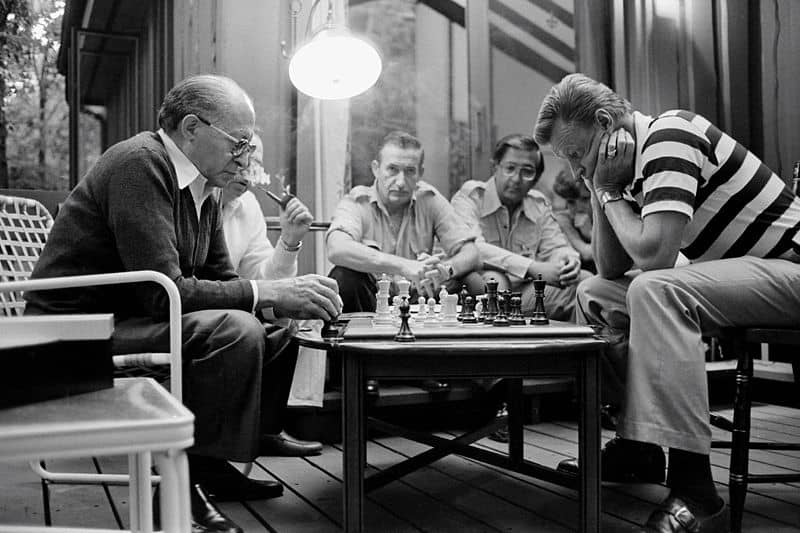
LEWIS: During Sunday, we were putting the final touches on the draft. Carter was preparing to launch his campaign with the other two leaders to get them to the signing point.
Sunday, in fact, turned into a cliffhanger, not a wind-down as it should have. That I gather is common to many conferences in which you think you have a deal, only to find out at the last minute that there are still issues to be resolved. That is what happened at Camp David on the final day.
We thought everything had been pretty well resolved. Then the all of a sudden, the issue of Jerusalem exploded unexpectedly. Since no meeting of the minds was possible on the issue. it had been agreed by the three delegations that each would state its own view of the problem in a letter to be attached to the agreement.
Actually, we had all agreed on some language at one point — a simple statement that Jerusalem should remain undivided, the rights to the holy places should be respected and that Jerusalem’s ultimate status should be left to further negotiations — all very vague and general — but Sadat was persuaded Saturday night by his advisors not to agree to that because it was giving away too much for Arab sensitivities.
Sadat was convinced that it would have been better to be silent on the subject than to have a minimal agreement that was achievable. On the basis of our understanding, we had drafted a letter on our position on Jerusalem, addressed to Sadat and Begin. We delivered that letter to the Israelis so that they could see it in advance before they delivered their letter to us.
The difficulties arose because Carter and Vance thought that it had been clear to Begin that the U.S. would restate our view on Jerusalem — that our views would be stated in addition to the Israeli and Egyptian views. The fact that we had to state our views is because that was the understanding we had reached with Sadat in exchange for his approval of dropping the whole issue out of the final Camp David agreement.
He knew of course, that our view was somewhat closer to his than it was to that of Israel’s and he wanted our view on the public record, even if were to be in a side letter.
This was one of the two topics that was discussed in the marathon meeting Saturday night. It is there that the misunderstanding started which is not surprising in light of the weariness of the participants which may have made them miss the nuances. It is a lesson why negotiations should not be carried on too late at night.
So on Sunday morning, Vance read to Dayan the text of our draft letter on Jerusalem, which was essentially a summary of statements that [U.S. Ambassadors to the United Nations] Arthur Goldberg and Charles Yost had made to the UN previously in 1967 and 1969.
Dayan was very upset to hear our position restated so baldly — namely that the status of Jerusalem was subject to later negotiations, which along with other nuances, implied that we viewed Jerusalem as occupied territory and not an integral part of Israel. Dayan went off to explain it to Begin. He was particularly upset by a phrase which identified East Jerusalem as occupied territory. (We should note that the same issues have recently arisen again….)
Shortly after that meeting broke up at about 12:30 and the Israelis went off to lunch, I got an agitated call from Meir Rosenne, the legal advisor of the Foreign Affairs Ministry and a member of the Israeli delegation. He wanted a copy of our letter immediately, which I brought to him, after carefully marking it “First draft-uncleared”.
When I arrived at the Israeli cabin, I found Begin fuming angrily to his colleagues, all of whom looked very worried. Dayan took me aside and described to me Begin’s explosion at the idea that the U.S. would put forth its position at this last moment. He urged me to try to convince Vance that our draft had to be killed or that the conference might break down.
Begin was furious when he spoke to his delegation. So I went back and reported to Vance, who insisted that Begin had been told of our intentions the night before and had not objected. Carter had given assurances just that Sunday morning that we would state our position in a side letter. The public restatement of our position on Jerusalem was sine qua non for Sadat’s signature to the final agreement.
It was Vance’s view that Begin would just have to swallow it. I told Vance that I didn’t think he would; he didn’t seem to be bluffing. I also told Vance that none of the three Israelis who were present at the Saturday night meeting — Begin, Dayan and Barak — would admit that they had heard anything about our intention to restate our views on Jerusalem. I went back to Dayan; Begin was adamant.

Finally we got Dayan and Barak to meet with Vance in the pool hall in Holly Cabin. Carter and Mondale suddenly joined in. Then Jordan and Dinitz and Weizman and Saunders and I also joined. It began to be a crowd.
Carter was polite, but cool and tough. He said he could not go back on his word to Sadat. He had made known his intentions to make the letter public the night before. He tactfully pointed out that it was not the Israeli responsibility to tell the U.S. whether or where or how it should state its views and policies.
The meeting broke up in a pessimistic view. Then Carter picked up a hint from Dayan. He asked Vance to look at the language of our draft letter again to see what could be done to ease Israeli concerns without breaking his commitment to Sadat. In fact, Vance had already realized by then that the original language could not stand and had already commissioned a new draft. It was practically ready when Carter asked for it.
The new draft merely said that our new position was as had been stated by Goldberg and Yost, but didn’t restate it. This version was eventually accepted by both Begin and Sadat. So the “Jerusalem crisis” was contained and didn’t raise its head again at Camp David.
This episode was a good illustration of the last-minute unexpected events that can blow up towards the end of a conference, which can be resolved, but that at the moment looks like a sure tragedy. In retrospect, I think that the Jerusalem issue could have wrecked the conference because on Sunday morning, although the Israelis were so close to achieving peace with Egypt and would not have wished to have it slip away, Begin might have driven Sadat out of the game inadvertently if he had dragged the meeting out further.
Sealing the Deal – Euphoric Israel, Scared Egypt

LEWIS: At approximately 5:30 p.m., that Sunday afternoon, after the deal had been sealed, we were deluged by a cloudburst, which delayed our departure for about an hour. We then took all the documents and got on helicopters to the White House.
The Israeli delegation, which I accompanied on their helicopter, was euphoric. Everybody was very happy.
The Egyptians were putting up a good front, but they were essentially very unhappy and scared. Many members of the Egyptian delegation genuinely felt they were committing suicide by being party to this peace agreement. They felt that eventually they might lose their lives because of their participation. Kamal had told Sadat two days earlier that he would resign because he couldn’t support Sadat’s determination to reach agreement. Sadat prevailed on him to stay through the conference.
It was clear that Begin’s rather obnoxious and difficult negotiating strategy had paid off. I thought then and I still believe now that Israel got a somewhat better deal than Egypt did, but that both sides had made a good many concessions. It was obvious that neither side was totally satisfied which I consider a good negotiating outcome.
Begin would have some political problems at home about what he had given away in Sinai — the settlements — and other issues, but I was sure that he could overcome the problems because Labor would certainly support him even if all of the Likud didn’t. That is what ultimately happened in the Knesset.
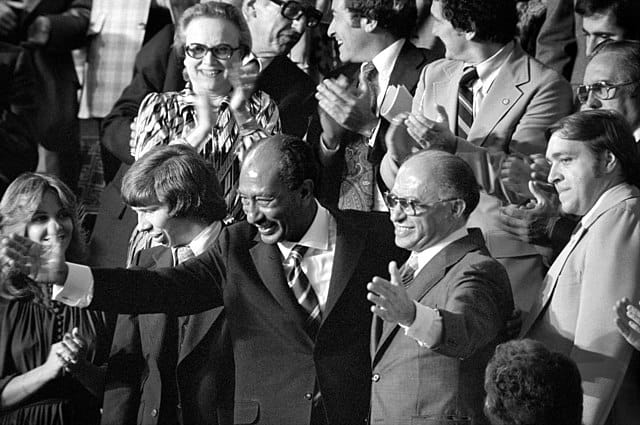
That Sunday evening, we landed at the Washington Monument helipad at about 9:45 p.m. and motorcaded to the White House. Most everyone went to the East Room for the formal announcement to the world.
No one outside the delegations knew that success had been achieved. All the hints coming out of Camp David in the few previous days had been pessimistic.
So the outcome of the conference came as a terrific bombshell for the press, the Congress, the various publics in Israel and Egypt. Interestingly, when we went up to the East Room, only a couple of members of the Egyptian delegation went.
Al Baz was one of them, being very faithful to Sadat and happy that the agreement had been reached. Two or three others drifted away so that they wouldn’t be photographed. The Israelis were all there. Carter, Begin and Sadat sat on the rostrum.
Begin stole the show; he made a warm and witty speech. Sadat gave a formal speech, praising Carter, but not mentioning Begin at all. Then the famous picture was taken; this is the one that got a lot of press play. Begin embraced Carter and then Sadat for a photo opportunity which he was anxious to have on the record. He mouse-trapped Sadat into that picture; Sadat couldn’t avoid it. It was a very smooth performance.
Troubles With the Accords and an Opportunity Lost
EILTS: That Sunday night, after the signing ceremony, but after we went to the State Department and sent messages all over the world, including to Arab leaders, explaining the agreement, and indicating we also had agreement, not textually in the accords but as a side agreement, a protracted settlement freeze for the West Bank and Gaza and asking for their support.
By then, Sadat’s Foreign Minister had resigned in protest against the Camp David accords when Carter got the letter from Begin on Monday. It didn’t speak of a protracted settlement freeze. Instead, it spoke of a three-month freeze, tied to the time period stipulated in the Sinai agreement for the conclusion of an Israeli-Egyptian peace treaty.
This had nothing to do with the West Bank-Gaza. Carter would not go back to Begin, he would not himself call Begin and say, “Look, this is not consistent with your agreement of yesterday.” I guess he wasn’t sure.
Quite frankly, he rushed through finishing the Camp David accords and perhaps allowed himself to be taken in. And then later, that same Monday, Begin went to New York and made a public statement on what he meant by autonomy for the West Bank. This made it very clear that what he had in mind was totally different from what we had sent out as our explanatory messages to Arab and other leaders. So the Arab states, as you know, generally wouldn’t agree.
But Camp David was a modest accomplishment. My problem with Camp David is two-fold: one that we gave away too much. Certainly Carter, in going into the Summit, had much grander ideas of what could come out of it, including doing something for the Palestinians.
But given the difficulties of the first ten days; and then, the vast array of nitty-gritty work that had to be done in the last two days, by which time he just had to get back to the White House — these were all important elements of the overall problem. Carter knew the problems intimately because he had briefed himself better than any President, but these issues were not given the time that they deserved.
Several suggestions were made — “Can’t we stay a little longer?” But, after all, by that time the President had been away from Washington for two weeks and that was in itself remarkable. My second is this: that then we did not, either under Carter and certainly not under Reagan, take what we had obtained in Camp David and try to develop it into something more meaningful. Once we got the Egyptian-Israeli peace treaty, that was pretty much it. The following West Bank-Gaza autonomy talks languished.
For Carter, of course, he couldn’t involve himself. He was in the election campaign. He had the Iranian hostage crisis. He named Bob Strauss — Bob Strauss is a great fellow, the former chairman of the Democratic Party — but Bob didn’t like that job. Then he named Ambassador Sol Linowitz. What little was accomplished in the autonomy talks is largely the result of Sol Linowitz’s work.
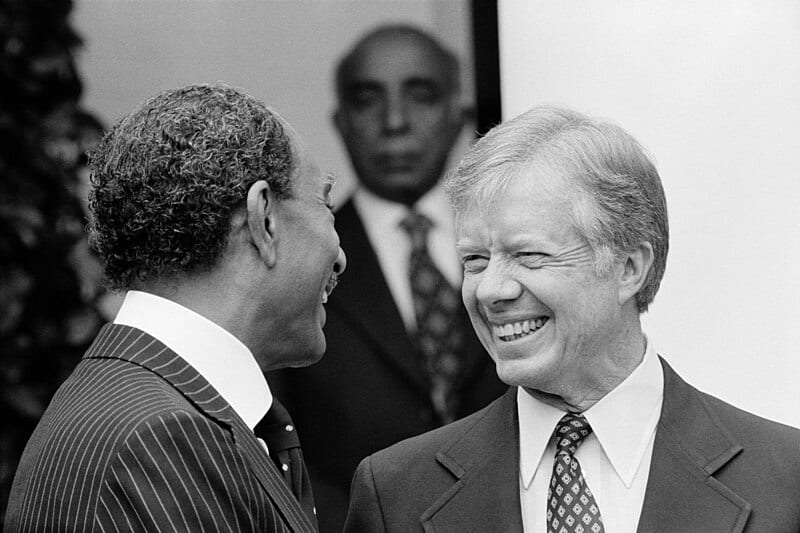
But then came a new Administration with a different sense of priorities. The whole idea of autonomy talks that flowed from Camp David was given short shrift. A minor functionary of Secretary Haig’s was named to conduct them.
Well, that was not — that kind of a figure, as American representative who had to deal with five Israeli Ministers, (they had by then named five Ministers), and an Egyptian Prime Minister, who was in a position to make anything out of it.
And the Reagan administration, it seemed, really didn’t care. It had strategic consensus and the Soviets on its mind, things of that sort.
So the two problems, in my view, we did not at the end of Camp David work enough to prevent some of the dangers that, at least many of us, saw. And, second, afterward for a variety of reasons, we did not try vigorously to make something out of Camp David.
